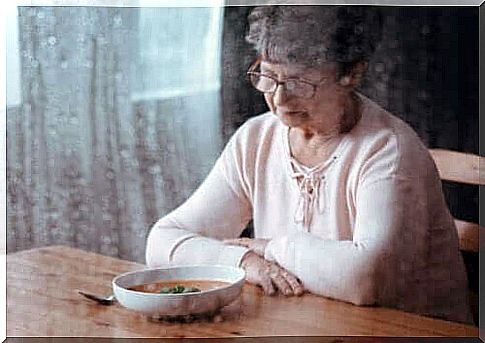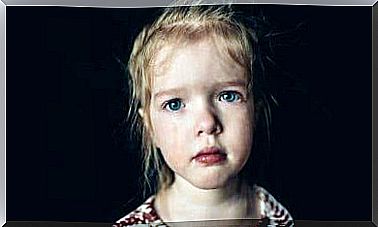Loss Of Appetite: Why Does It Occur?

You have probably experienced a sudden (or gradual) loss of appetite before. This symptom may be normal if it occurs at certain moments in your life. However, when this becomes recurrent or intense, you must consult a doctor so that you do not risk your health.
In this article we will talk about some of the possible causes that can explain loss of appetite. As you can see, there are both medical and psychological reasons (in some cases it can be a combination of both).
Loss of appetite: Why does it occur?
Before we go into possible causes that may explain loss of appetite, we will explain what it consists of. Basically, it occurs when the desire to eat decreases or disappears. In some sources, abnormal lack of appetite is called anorexia. Therefore, it is important that you do not confuse it with the eating disorder, which has the same name.
Loss of appetite can occur at different times in your life (and it does not have to be something to worry about). For example, it may be because you are going through a specific period of stress. However, if this happens repeatedly or intensely, the situation can make you sick. When this happens, it is therefore best to go to a medical professional so that they can evaluate your case.
Why does loss of appetite occur? We will list some of the possible causes. Nevertheless, each individual case should be considered.
Infectious diseases
Certain infectious diseases can explain a lack of appetite, especially those that affect the digestive tract and inhibit a person’s desire to eat.
Some of them come from food poisoning. On the other hand, certain food intolerances, such as lactose or gluten intolerance, can also reduce appetite.
Intense emotional stress
Going through a period of intense emotional stress can lead to severe loss of appetite. Emotional stress can occur as a consequence of several things. For example, moving to another country, changing jobs, unemployment, losing a loved one, the end of a relationship, falling in love and giving birth to a child, among others. As you can see, both positive and negative situations can generate emotional stress.

Possible causes of loss of appetite: Side effects of certain drugs
Loss of appetite can also occur due to the side effects of certain medications, such as weight loss medications or psychostimulants (to treat disorders such as ADHD). On the other hand, chemotherapy can also cause this symptom.
Other illnesses
Certain diseases can also lead to a lack or decrease in a person’s appetite. A study conducted by Domínguez, Nold, Llorente and Ramírez (2011) at the Superior Institute of Medical Sciences in Santiago suggests that kidney or heart failure and hepatitis are some of these diseases, as well as HIV.
Another disease that can explain this symptom is cancer. Sometimes a lack of appetite occurs in the advanced stages of this disease. Other times, the individual may experience it in the beginning.
Possible causes of loss of appetite: mental disorders
Some mental disorders can also cause this symptom. The most common are depression, dysthymia, anorexia, anxiety disorders and schizophrenia.
A person’s state of mind
According to a study by Baena, Sandoval, Urbina, Juárez and Villaseñor (2005), bad mood can also explain a sudden loss of appetite. You may not have noticed it, but when you feel down, you tend to be less hungry. However, we must say that some people experience the opposite, so they tend to eat more when they are sad.
Possible causes of loss of appetite: Old age
Old age is a stage in life where loss of appetite often occurs (Bofill, 2005). In these cases, this symptom was named hyporexia (it is also used to refer to loss of appetite in children).
Some of the reasons that can explain hyporexia in older people are on the one hand that older people tend to experience smell and taste less than younger people, and on the other hand certain social and personal conditions (loss of loved ones, to feel lonely or abandoned, and side effects of some drugs, among other causes).

Time of year (summer)
Some people tend to experience a lack of appetite more often in the summer. This is because the body at this time does not need as much food to stay warm (which, for example, does not happen in winter). In addition, the metabolism is reduced, and it is therefore common to lose the desire to eat.
But what happens in the winter? You feel hungry because your body needs more food to save heat and more energy to burn and maintain body temperature.
Listening to your body
As you can see, the reasons that explain why you feel a sudden or gradual, transient or prolonged loss of appetite are many. From intense or negative emotional states, to stressful situations, to medical illnesses or mental disorders.
To avoid endangering your health, you need to be aware of your body and be aware of your symptoms and vital situations and moods. If you keep this in mind, it will be easier for you to ask for help when you need it.









